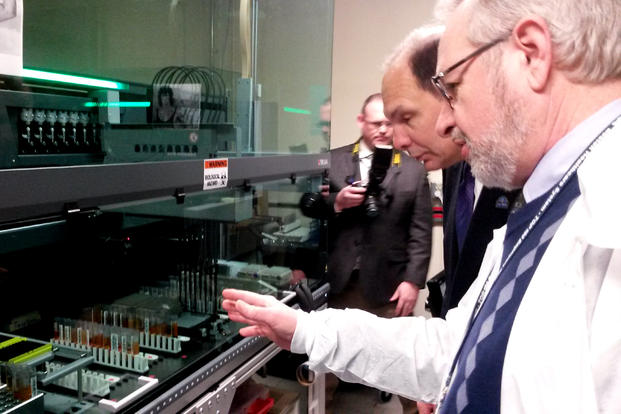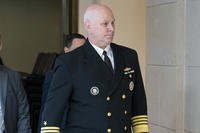A major Veterans Affairs Department initiative to collect the DNA of a million vets for the purpose of medical research is getting a boost starting today from the Pentagon, which has authorized soldiers, sailors, Marines and airmen to donate their blood to the cause.
Word of the program's expansion came from the White House, which said VA program would play a role in the Precision Medicine Initiative President Obama announced in January 2015. The initiative is intended broaden medical research to find new treatments for a range of diseases as well as tailor health care to individuals based on their genetic makeup.
"The [VA's] Million Veterans Program has enrolled more than 450,000 veterans to date," said Dr. John Holdren, director of the White House Office of Science and Technology Policy, "and as will be announced [on Thursday] this innovate research platform will be open to active duty women and men, as well as veterans."
The massive DNA collection -- which will be the largest biorepository in the world -- will provide qualified researchers with samples or cohorts in large enough numbers to see measurable results.
The VA began collecting DNA from veteran volunteers about six years ago. As of last month it had more than 1.8 million vials of blood stored in its biorepository at the VA Medical Center in Boston. VA Secretary Bob McDonald, who donated his own blood to the collection, said the veterans' DNA will be used as part of the cancer Moon shot announced by President Obama during his State of the Union message last month.
Dr. Mary Brophy, director of the VA biorepository, told Military.com in January that the collection represents one-stop shopping for a specific patient cohort and control group needed for any medical research project.
"If I want to do a study in Gulf War Illness, before I would have to go out and find all these patients with Gulf War Illness, do it myself, Then get the samples, store it and send it out" to research lab, she said.
The biorepository eliminates those time-consuming steps, she said, by making VA the go-to place for medical researchers.
The VA has been adding about 100,000 veterans' samples per year, which put it on target to hit the million mark around 2022.
But with the DoD joining the initiative the VA expects to be able to add an additional 25,000 donors a year, perhaps allowing them to reach one million by 2020, Brophy said.
Holdren said that the goal of PMI is to build a DNA cohort of 1 million donors, which means the project -- because of the VA's work of the past six years -- is already close to halfway there.
Holdren said Wednesday during a background briefing on the project that the goal is to reach 1 million by 2019.
"Research on this scale promises to lead to new prevention strategies, to novel therapeutics and medical devices, to improvements in how drugs are prescribed all on a individual, personalize and precise basis," he said.
The Precision Medicine Initiative is being led by the National Institutes of Health. In addition to participation by the VA and Defense Department, it also has established partnerships with universities and the private health care sector.
About 170 government officials, researchers, physicians, technologists and patient group members will convene at the White House to confer on the program, Holdren said.
The White House also expects on Wednesday to name 40 companies, non-profits, universities, advocacy groups and health care delivery systems who are taking part in the initiative. Among these, Holdren said, are six health care record vendors who have committed to deploying the necessary technology enabling volunteers to donate their own health records to the research cohort.
In addition to the blood/DNA samples, the project also requires collecting the medical records of the volunteers.
--Bryant Jordan can be reached at bryant.jordan@military.com. Follow him on Twitter at @bryantjordan.


























